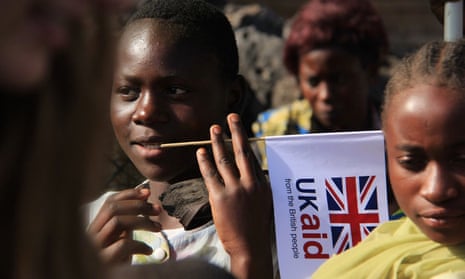The British public remains firmly behind efforts to support people in poorer countries, with almost two-thirds of people canvassed in a survey of EU citizens believing that maintaining overseas aid at its current level should be “a major priority”.
The results from Eurobarometer, the EU’s polling organisation, also found that almost 90% of people thought helping people in developing countries should be a priority of the EU and national governments.
Romilly Greenhill, UK director of the advocacy group the One Campaign, said it was “heartening” that the vast majority of British people believe that helping people in developing countries is the right thing to do.
“Despite the gloomy picture often painted, British people support building a more peaceful, progressive and prosperous world for all,” she said.
Greenhill was encouraged by the finding that showed almost two-thirds of the British public think tackling poverty in developing countries should be “a major priority” for the UK government. “While Britain’s relationship with the world is changing, this shows we are still an outward looking country,” Greenhill said.
The annual poll, which was conducted face to face in June 2019 among 26,464 Europeans, canvassed views on migration, the private sector and gender. It also asked what people thought should be the role of national governments and the EU in development.
Claire Godfrey, interim director of policy, advocacy and research at Bond, the British network for organisations working in international development, said the survey was “incredibly timely” as the UK government begins to redefine its role in a post-Brexit world.
British respondents were among the most positive about helping people in developing countries, but more sceptical than last year about development as a means to tackle migration.
In line with the EU average, British citizens think that the EU should strengthen its partnership with African countries and increase financial investment in the continent.
“Politicians in Westminster should heed this news,” said Greenhill. “Whatever the problems they grapple with today, British people are focusing on tomorrow, and believe that helping people in developing countries contributes to a more peaceful and fairer world.”
Across the 28 member countries, the poll revealed broad consensus among European citizens on the significance of cross-border cooperation and development. Just as in the UK, almost 90% of EU citizens said that it is important to support people in developing countries, confirming a trend established over recent years.
Development emerged as one of the most positively perceived EU policies.
The European commissioner for International Cooperation and Development, Neven Mimica, said he was “very happy” to see that Europeans continue their “strong support” for development and key priorities like “strengthening partnerships with Africa; deepening our engagement to create jobs; and bringing in more private investments”.
Mimica said this support was a “solid basis for the union to maintain its leading global role and address the significant challenges that remain”.
Bond has been working with its members on continuity in funding and service following Brexit.
Godfrey said it was reassuring to see that, “despite the loud voices shouting down the importance and public support behind UK aid, in fact seven out of 10 people think our aid contribution doesn’t need changing or even should be increased, while over 60% of those interviewed think tackling poverty in developing countries should be a main priority of government”.
The British public understood that “fairer trade, tax, ethical investments, transparency and tackling climate change are good for reducing poverty, inequality and combating environmental harm,” she said.
Looking ahead, Godfrey said: “The government, and any future government, should take note of these results when thinking about what our development and aid priorities should be following Brexit.”
In 2013, the UK joined the leading group of donors that have met the UN-target of spending 0.7% of gross national income on aid, laid down in 1970. Despite backbench opposition, this commitment was then enshrined in law in 2015.
This year’s survey follows closer scrutiny of the rules that mean refugee costs can formally be counted as “official development assistance” – the convention agreed by the Organisation for Economic Cooperation and Development for what is eligible as part of 0.7% commitment.
Funding for detention centres, border security and patrols, and the costs of returning failed asylum-seekers are now clearly excluded. Spending on asylum seekers once their application is rejected, or on refugees considered as “in transit” to other countries where they intend to resettle, is also ruled out.
